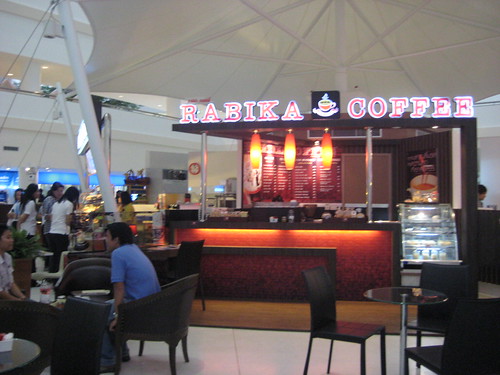The flood that has ravaged Manila recently is an eye-opener to all of us. Last year, it's here in Bangkok that had warned its people for an upcoming storm surge so most people including myself prepared for it. But never did officials in Manila warn people for this catastrophe so the effect is enormous causing many casualties, damaged properties and countless homeless people. But it's too late for finger-pointing which may not help at all at this time. We have seen the effects but we must now ask what every individual can do to prevent the cause.
Yahoo news states, "given the looming specter of
climate change, they may have to find a way sooner rather than later. The prospect of another typhoon this week underscores environmentalists' concern that shifts in
global temperatures may mean increasingly
extreme weather patterns for coastal cities like Manila".
While it's true that there is nothing we can do with climate change in terms of natural factors such as solar radiation and volcanism, if all individuals reduce human activities that may worsen the greenhouse effect, we can still save the earth from destruction.
Wikipedia says that "changes in atmospheric concentrations of greenhouse gases and aerosols, land cover and solar radiation alter the energy balance of the climate system". According to the US Geological Survey, estimates are that human activities generate more than 130 times the amount of carbon dioxide emitted by volcanoes
(Wikipedia).
Wiki also claims that "increases in anthropogenic greenhouse gas concentrations is very likely to have caused most of the increases in global average temperatures since the mid-20th century".
U.S. EPA ranks the major greenhouse gas contributing end-user sectors in the following order: industrial, transportation, residential, commercial and agricultural.
Major sources of an individual's Greenhouse Gases or GHG include home heating and cooling, electricity consumption, and transportation.
So here are simple ways we as individuals can do to help prevent climate change and its effect such as flood:
1.
Save everything we can.
To help save our environment and prevent climate change which results into flood, let's save everything we can such as clothes, tissue papers, soap, food even appliances so that industrial or manufacturing companies which are the number one contributor of GHG won't produce over and over just to cater to our needs (and even to just our WANTS!). In doing this, use of fossil fuels, electricity and materials in producing anything we need will be reduced. Having too many clothes, for example, demands producers to manufacture more and changing clothes more often requires soap to wash them so it necessitates more production of clothes and soap. More demands, more gas to be consumed as well in delivering them to the outlets that sell them. It's a vicious cycle that can be cut down only by end-users. If there's less demand, there's less production. Less production, less pollutants.
2. Use transportation less.
Transportation is next to industrial companies as major source of pollutants. As much as possible, families should own just one or fewer cars even if they can afford them. Family members or even friends should share a ride by planning a good route to their destinations. Mass transportation such as buses, trains or other public rides are a better option in saving energy, in reducing CO2 emissions and in requiring car companies to produce more.
Walk more often. Aside form the health benefits we can gain out of walking, we can also reduce carbon dioxide emission from vehicles if many of us just walk as much as we can.
For example, I walk going to my workplace and back home everyday unless if I'm in real hurry. I see many people here in Thailand who use bikes in going to their workplace or the university.
3. Reduce use of air conditioners.
In the household level, CFC used in air conditioners is very harmful to our ozone layer and can contribute to climate change. At home, we just turn on the air conditioner for a few hours just to cool down the room then use electric fan most of the time. At the office, if I'm the only one working, I turn off the air conditioner a couple of hours before I leave and instead of using two units, I use only one. Air conditioners consume much energy so by doing such, we can also save energy and thus, fossil fuel which makes up 86% in primary energy production in the world. Let's remember that fossil fuel-fired electric power plants also emit carbon dioxide that may contribute to climate change.
4. Reduce, refuse and reuse plastics.
"The raw material of plastics is oil, so the more we use plastics, the more we waste oil - a non-renewable energy source," explains
Earth Day Network. Aside from this fact, plastics take decades to break down and is only 1% recyclable so they litter around. A lot of plastics have been found clogging the drains in Manila during the flood brought about by Ondoy. Had it not been for the clogged drainage due to too much plastic wastes which are not biodegradable, the flood's effect would have not been as terrible as that. So what can we do to solve the plastic bag problem? Here in Thailand, Makro doesn't provide any plastics for free so shoppers have set their mind to reuse whatever available containers they have such as fabric bags or reusing plastic bags they already have. If governments cannot pass a law such as what is done in Israel, Germany, South Africa and Ireland where plastic bag is surcharged, then we as individuals must do something. Here in Thailand where plastics are provided abundantly at supermarkets and anywhere, this is what I personally practice. I help the cashier bag my own groceries so I combine what I can in just few plastic bags and refuse doubling them. Then at home, instead of buying the black plastic bags for our garbage, we reuse the bags from the supermarkets. In going to the market, we bring our own plastic bags. We also avoid drinking bottled waters. We simply refill the old bottles we have.


In doing these simple steps collectively and in sharing these to others, we can together help save our environment. We can prevent climate change and floods. We can save ourselves from the wrath Mother Nature may take revenge on us with all our abuses to her.








































